(!)NOTE : Windows 7 users won’t be able to use some latest features of eCatalog/WOS since Microsoft is ending support for Windows 7 on 14 Jan, 2020. Please upgrade your system for uninterrupted services.
- Please note that the MISUMI Pune office and warehouse will be closed on November 20th due to the state election.
- Notice of End of Sales for Economy Series Pneumatic Equipment Category. More information.
FUJI LATEX Hinges(Body Material:Aluminum)
Search by specifying the lower class category
Brand |
|
|---|---|
| CAD |
|
| Days to Ship |
|
1 items
- Sort By
-
You can add up to 6 items per a category to the compare list.
![FHD-B1/B2 Series, Friction Hinge Damper [Bidirectional]](//in.misumi-ec.com/linked/material/mech/FUL1/PHOTO/221000019689_001.jpg?$product_view_b$)
FHD-B1/B2 Series, Friction Hinge Damper [Bidirectional]
FUJI LATEX
This damper is a friction type damper in the shape of a hinge. Easy to install, and torque is applied both in the opening direction and closing direction.
[Features]
· Damper characteristics vary with the operating environment temperatures. The damper characteristics become weaker as the temperature rises, and becomes stronger as the temperature decreases.
· This is because the shaft bush inside the damper changes as an effect of the temperature, and if the temperature returns to normal, the damper characteristics return to normal as well- CAD :
- 2D
Length L(mm) Flat Hinge Type Width W(mm) Body Material Main Body Type Operating Environment Mounting Method Additional Function Mounting Screw Hole Type Detachable, Flag Hinge Type Main Body Surface Treatment Reversed Cleaning Method Characteristics/Applications Material Details Environmentally friendly 52 - 43 Aluminum Damper/Torque/Spring Hinge Standard Screw Mounting With Damper - - - For Right Side / For Left Side - - - - From: ₹ 1,260.78 Days to Ship: 34 Day(s) or more  34 Day(s) or more
34 Day(s) or more
| Brand |
|---|
| Product Series |
| CAD |
| From |
| Days to Ship |
| Length L(mm) |
| Flat Hinge Type |
| Width W(mm) |
| Body Material |
| Main Body Type |
| Operating Environment |
| Mounting Method |
| Additional Function |
| Mounting Screw Hole Type |
| Detachable, Flag Hinge Type |
| Main Body Surface Treatment |
| Reversed |
| Cleaning Method |
| Characteristics/Applications |
| Material Details |
| Environmentally friendly |
You can add up to 6 items per a category to the compare list. | |
| Brand | FUJI LATEX |
| Product Series | |
| CAD |
|
| From | ₹ 1,260.78 |
| Days to Ship | 34 Day(s) or more |
| Length L(mm) | 52 |
| Flat Hinge Type | - |
| Width W(mm) | 43 |
| Body Material | Aluminum |
| Main Body Type | Damper/Torque/Spring Hinge |
| Operating Environment | Standard |
| Mounting Method | Screw Mounting |
| Additional Function | With Damper |
| Mounting Screw Hole Type | - |
| Detachable, Flag Hinge Type | - |
| Main Body Surface Treatment | - |
| Reversed | For Right Side / For Left Side |
| Cleaning Method | - |
| Characteristics/Applications | - |
| Material Details | - |
| Environmentally friendly | - |
Loading...
Configure
Specification/Dimensions
-
Length L(mm)
- 2,000
- 6
- 6.5
- 17
- 19
- 20
- 22
- 23.5
- 24
- 25
- 25.5
- 26
- 27.5
- 29
- 30
- 31
- 31.5
- 32
- 33
- 34
- 35
- 36
- 37
- 38
- 40
- 40.5
- 41
- 42
- 43
- 44
- 45
- 46
- 47
- 48
- 50
- 50.5
- 51
- 52
- 54
- 54.5
- 55
- 56
- 57
- 59
- 60
- 61
- 62
- 63
- 63.4
- 63.5
- 64
- 65
- 66
- 67
- 68
- 70
- 71
- 71.7
- 72
- 73
- 75
- 75.5
- 76
- 76.5
- 76.7
- 77
- 78
- 79
- 80
- 81
- 81.7
- 82
- 83
- 84
- 85
- 86
- 86.7
- 87
- 87.5
- 88
- 89
- 90
- 92
- 94
- 95
- 95.3
- 96
- 100
- 101
- 101.2
- 101.5
- 101.7
- 102
- 103
- 104
- 106
- 107
- 108
- 109
- 110
- 113
- 114
- 114.5
- 115
- 117.5
- 118
- 120
- 121
- 123
- 124
- 125
- 126
- 126.5
- 127
- 130
- 132
- 132.5
- 138
- 139
- 139.7
- 140
- 144
- 145
- 148
- 149
- 150
- 151
- 152
- 152.5
- 153
- 154
- 155
- 158
- 160
- 161
- 161.5
- 162
- 170
- 183
- 184
- 186
- 186.4
- 190
- 200
- 201
- 204
- 210
- 222.3
- 224
- 225
- 250
- 258
- 264
- 289.3
- 300
- 340
- 350
- 400
- 442
- 450
- 476
- 576
- 600
- 626
- 750
- 850
- 900
- 1000
- 1200
- 1800
- 1829
- 1872
- 2000
- 2133
- 2400
- 2500
-
Flat Hinge Type
-
Width W(mm)
-
Body Material
- Stainless Steel
- Steel
- Brass
- Aluminum
- Zinc Alloy
- Resin
-
Main Body Type
-
Operating Environment
- Standard
- Corrosion Resistance
- Abrasion Resistance
- Cleanroom
-
Mounting Method
-
Additional Function
-
Mounting Screw Hole Type
-
Detachable, Flag Hinge Type
-
Main Body Surface Treatment
-
Reversed
-
Cleaning Method
- Degreasing
- Precision Cleaning
- Electrolytic Polishing + Precision Cleaning
-
Characteristics/Applications
-
Material Details
-
Environmentally friendly
- RoHS Compliant (10 Substances)
- Not RoHS Compliant
Narrow search by specifying Manufacturer
-
- MISUMI (0)
- TAKIGEN (35)
- FUJI LATEX (1)
- RICHENGINEERING (0)
- KYODO KINZOKU (0)
- BEST (0)
- ESCO (0)
- HILOGIK (0)
- WAKISANGYO (0)
- TRUSCO NAKAYAMA (0)
- ACCURATE (0)
- SOWA (0)
- TOK BEARING (0)
Related Categories to Hinges
FAQ about Hinges
- Question: What is the opening/closing angle of hinge?
- Answer: Opening angle is 180° where the hinge plates are aligned in horizontally,
Closing angle is 0° where the front surfaces of each plate overlapping. - Question: What is the meaning of Left-hand and Right-hand hinge?
- Answer: Left-hand hinge is a mechanism that hinge fixed at the left-hand side and can be opened or closed at the right-hand side when facing the door.
Right-hand hinge is a mechanism that hinge fixed at the right-hand side and can be opened or closed at the left-hand side when facing the door.
Please select product according to their function. - Question: When using in horizontal direction, is there any change in the allowable load?
- Answer: No change.
- Question: What materials are commonly used for hinges?
- Answer: Common materials used for hinges include:
1. Steel: Known for its strength, durability, and affordability, steel hinges are widely used across various applications.
2. Stainless Steel: Highly resistant to corrosion and staining, stainless steel hinges are commonly used in outdoor or high-humidity settings, as well as in medical or food processing equipment.
3. Aluminum: Lightweight and corrosion-resistant, aluminum hinges are favored for outdoor applications or where weight is a concern, such as on aluminum doors or cabinets.
4. Zinc: Zinc hinges provide a cost-effective option with decent corrosion resistance, often serving as an alternative to brass or steel hinges. - Question: How do I choose the right hinge for my needs?
- Answer: To choose the right hinge for your needs, consider the following factors:
1. Environment: Choose a hinge suitable for the environment it will be placed in, such as indoor or outdoor use
2. Type: Select the appropriate hinge type based on your application, such as Continuous Hinges, Butt hinge, Concealed Hinges and so on
3. Size: Ensure the hinge is of the correct size for the objects you want to connect, considering width, height, and length
4. Strength: Choose a hinge with sufficient strength to support the weight of the objects it will connect
5. Finish: Select a hinge finish that matches the appearance of your cabinets or doors, or choose a bold finish to draw attention
6. Material: Choose a hinge material that is suitable for your environment and application, such as stainless steel for outdoor use or brass for decorative purposes
7. Fastener holes: Consider the number of fastener holes and their location when choosing a hinge - Question: Are there any hinges suitable for heavy loads or special environments?
- Answer: Yes, there are hinges suitable for heavy loads or special environments. Heavy-duty hinges are designed to withstand substantial loads and frequent use, making them ideal for industrial and commercial. These hinges are available in various types, including continuous hinges, concealed hinges, and Torque Hinges. They are typically made from robust materials such as steel and stainless steel, often featuring protective coatings or materials that make them suitable for outdoor or harsh environments.
- Question: How do I install different types of hinges?
- Answer: Installing different types of hinges can vary depending on the type of hinge and the application. However, there are some general steps that can be followed.
1. Determine the type of hinge needed for the application. Common types of hinges include Continuous Hinges, Butt hinge,Concealed Hinges
2. Determine the placement of the hinge on the door or cabinet.
3. Drill holes for the screws using a Vix bit or a specialty bit that drills holes centered on a hinge's mounting holes.
4. Insert screws into the holes and tighten them.
5. Test the hinge to ensure it is properly installed and functioning correctly. - Question: What should I consider for hinge maintenance?
- Answer: To maintain hinges effectively, consider the following guidelines:
1. Lubrication: Apply light oil or silicone spray to non-self-lubricating hinges to prolong their lifespan.
2. Cleaning: Wipe off excess oil to prevent dirt buildup on hinges.
3. Tighten Screws: Regularly check and tighten loose screws, adding more if necessary for added support.
4. Check Alignment: Ensure hinges are aligned correctly and doors/gates are not sagging or misaligned.
5. Protection: Use weather-resistant materials for outdoor hinges to prevent rust and corrosion.
6. Regular Inspections: Periodically inspect hinges for signs of wear, damage, or misalignment.
7. Replace Worn Parts: Replace any worn or damaged components to maintain functionality and durability.
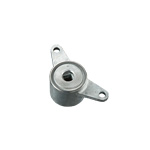
![FHD-B1/B2 Series, Friction Hinge Damper [Bidirectional]](http://in.misumi-ec.com/linked/material/mech/FUL1/PHOTO/221000019689_001.jpg?$product_view_b$)
![FHD-B1/B2 Series, Friction Hinge Damper [Bidirectional]](http://in.misumi-ec.com/linked/material/mech/FUL1/PHOTO/221000019689_001.jpg?$product_view_c$)
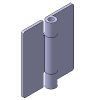
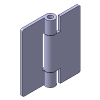

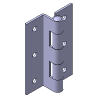
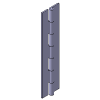



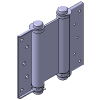
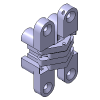


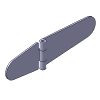

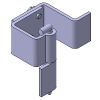



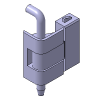

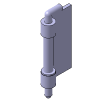

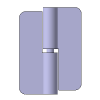
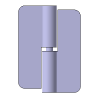




How can we improve?
How can we improve?
Thank you for your time.
Your feedback is essential for our continuous improvement
Privacy Policy
Thank you for your cooperation.
Thank you for your time.
Your feedback is essential for our continuous improvement
Please use the inquiry form.
Privacy Policy